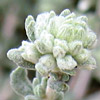Teucrium capitatum is a canescent sub-shrub that branches at the base into upright, ascending, or recumbent and unbranching stems. It thus sometimes has spherical or rhomboid shape with a diameter of 15-40 cm. All parts of the plant are covered with gray-white hairs. The cross-section of the stem is round, an exception to the rule in the family in which most members have quadrangular stems. The plant has a distinctive odor, which is reminiscent of sweets and not overly strong. The knowledgeable can distinguish between populations and varieties within the species by differences in their smell, coloration, and pubescence. The species can be recognized by its leaves: they are gray, small, elongated, sessile, soft, wooly, and pleasant to the touch. Leaf margins are crenate (with rounded teeth) and occasionally revolute (curling inwards). The leaves curl in a very distinctive manner.
T. capitatum flowers throughout the summer from April to August. The flowers have a single lip, are small, white, and arranged in a dense, spherical inflorescence at the tip of the stems. The flowers are pollinated by bees and ants.
T. capitatum grows in Mediterranean batha habitats and in moist habitats in the desert regions. It is a very common and widespread species in Israel, one of the few that can be found growing in all areas of the country, from the heights of the Hermon to Eilat. Globally, it is found in countries of the Mediterranean region and Middle East.
T. capitatum is considered one of the most important herbals in the regional folklore. Nissim Krispil designates it as the "queen of medicinal plants in the land of Israel". A tisane brewed from its leaves is used to increase appetite, for the treatment of open wounds, to calm babies, and against many maladies: pains, fever, chills, diabetes, asthma, intestinal worms, internal disease of the kidneys and genitals, intestinal tract lesions, respiratory problems, nausea during pregnancy, and weakness during menstruation. Some also believe it may help in the case of scorpion stings and to improve eyesight and memory. Long ago, T. capitatum was used to treat tumors of the intestine, spleen, and uterus, as well as jaundice. Connoisseurs point out the differences in the medicinal properties of different varieties or types of T. capitatum.
The genus ‘Teucrium’ is characterized by a corolla with a single lip (palate). More precisely, the upper lip of the corolla, (hood), is reduced so that it is very short, almost missing. The lower lip of the corolla is divided into five lobes: the central one is large and concave, and the others are elongated. The flowers have 4 stamens, unequal in length, which extend out of the corolla. The stigma is divided into two branches of almost equal length. The flower is pollinated by bees. The calyx is campanulate or tubular, with 10 veins and a 5-lobed margin. The Hebrew name is derived from the Arabic word for ‘curly’, because of the wavy margins of the leaves of the Teucrium capitatum plant. The Latin name refers to King Teucer of Troy, who supposedly recognized the medicinal properties of the plant. The genus includes 300 species worldwide, 11 of which are found in Israel, and of these, 2 are annuals, 5 are herbaceous perennials, 4 are sub-shrubs. Most of the Teucrium species in Israel are found in Mediterranean habitats.
Usage in traditional medicine and folklore:
The word for ‘Teucrium’ in Arabic means curled, and indeed, its curled, sweetish smelling leaves distinguish the species.
Teucrium’s medicinal properties have been known since ancient times. Even today, the plant plays an important role in folk medicine due to its high content of anti-bacterial essential oils. Drinking a tea infused with several T. capitatum leaves is considered the best medicine for stomach ailments, fevers, and colds. T. capitatum is also highly recommended as a remedy for nausea during pregnancy, pain and weakness during menstruation, diabetes, asthma, and gastrointestinal worms.
Written by Mike Livne






